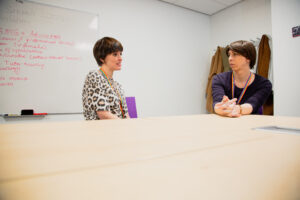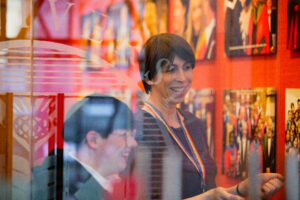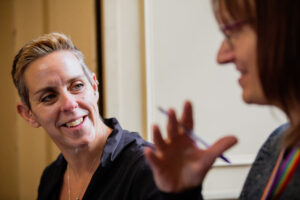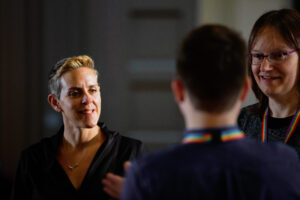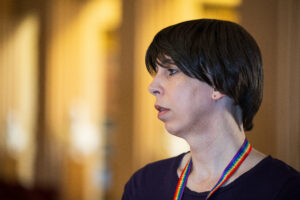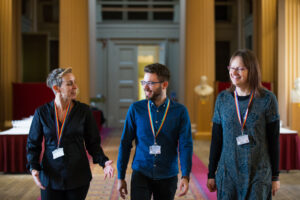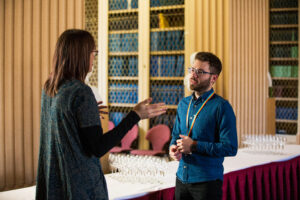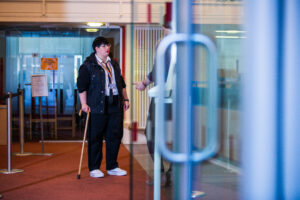By a trans member of staff at the University of Edinburgh who has chosen to remain anonymous
In December 2022 the University of Edinburgh cancelled a planned screening of “Adult Human Female”, a film that has received criticism for its one-sided and inflammatory depiction of trans people, after protests that the event would “contribute to an unsafe and unwelcoming environment on campus” for the trans community lead to a judgement by the University that “safety could no longer be guaranteed for all present”. This decision was met with calls of censorship by the filmmakers and their allies, and the University has now agreed to reschedule the screening for the 26th April, to be followed by a panel discussion. The University has argued that this film should be screened in the interests of academic freedom, freedom of expression and “facilitating an environment where staff and students feel that they are able to discuss challenging topics”. However, I argue that this film is not of sufficient academic standard to merit a showing on University campus, nor would a screening encourage “respectful debate and discussion”. If the University goes ahead with this event as planned, it would implicitly endorse unacademic and biased perspectives, thereby failing to uphold its own legal obligations “to ensure the health, safety and welfare of all employees whilst at work”, and failing to properly apply law and the University’s own Dignity and Respect Policy.
In order to explore this topic with nuance we must first examine the relevant context. There has been a 400% increase in journalistic coverage of transgender issues in recent years, with noticeable trends of oversimplification of the facts and concepts underpinning the debate, and inaccurate reporting around statistics and the law. A critical discourse study of representation of trans people in the British press carried out in 2019 by Paul Baker, Professor of Linguistics and English Language at Lancaster University, concluded that:
[While] on the surface there appear to have been improvements […] there are large swathes of the press which write about these topics in order to be critical of trans people and many articles which consequently paint trans people as unreasonable and aggressive. The picture suggests that the conservative press and most of the tabloids have shifted from an openly hostile and ridiculing stance on trans people towards a carefully worded but still very negative stance.
Such “carefully worded” negative coverage exemplifies tacit (or “dog whistle”) transphobia, defined as “actions designed to harm or take away trans people’s human rights […] even when not expressed in explicitly transphobic language”.
Moreover, further critical discourse studies have corroborated Baker’s findings, adding that their research had revealed linguistic patterns among journalistic coverage of trans issues which undermine point eight of the National Union of Journalists code of conduct, that a journalist should produce “no material likely to lead to hatred or discrimination on the grounds of a person’s age, gender, race, colour, creed, legal status, disability, marital status, or sexual orientation”, noting that “negative representations of transgender identities are offered to the readers, which contribute to the reinforcement of hate and transphobia” and linking the evolution of this coverage to rising rates of transphobic hate crimes (a 500% increase in Scotland between 2011/12 and 2021/2).
This anti-trans movement has been led by well-funded lobby groups who use recognised techniques of cognitive radicalisation to push its agenda under the cover of “reasonable concerns” and “free speech”. The main arguments of this movement, often self-titled “gender critical”, hinge on rejecting the concept of gender as a whole, asserting that biological sex is binary and immutable, positing trans people and their allies as delusional, and that any education on the topics of gender is ideological dogma. These assertions reject a wealth of academic research and oversimplify complex topics such as biological sex (biologists have been arguing that biological sex is not binary since the 1960s, and there is already a plethora of academic writing on how sex is a social construct). They also rely on outdated notions that transgender identities are a mental illness. Much has already been said about the flaws in trans-exclusionary logic. Suffice it to say the basic cognitive dissonance at the root of this movement renders debate extremely difficult; by rejecting the concept of gender identity, the entire academic field of gender studies is also rejected along with upwards of 60 years of research and analysis. The movement has received criticism for citing sources which have been roundly debunked for their methodological flaws and bias. It relies heavily on anecdotal evidence and lived experience, while rejecting the same from trans individuals and allies. For these reasons it is nigh impossible to have a productive conversation in good faith with “gender critical” activists, as has been documented myriad times.
Now that the stage has been set, let us turn out attention to “Adult Human Female”. The film’s main thesis, that trans rights threaten women’s rights, relies on the same assertions mentioned above: that gender does not exist, that biological sex is binary and unchangeable, and that at best trans people are deluded, at worst they are using trans identity to act with criminal intent. The film bases its entire argument on the idea that the trans rights movement is eroding women’s rights, right down to the definition of the word “woman”, hence the film’s title. Ignoring the fact that the philosophical thesis of “Adult Human Female” as the only definition of “woman” has itself already been thoroughly dissected and disproven, the name of the film itself is a well-known dog whistle, (a seemingly innocuous phrase designed to communicate hidden meanings to those “in the know” and to stoke outrage when criticised by those aware of its true significance): it directly references a publicity campaign by prominent anti-trans activist Kellie-Jay Keen-Minshull, AKA Posie Parker which was roundly condemned as transphobic. Keen-Minshull has spoken openly about how she believes transition is “preposterous” and that single-sex toilets should be policed by “men with guns.” She has engaged in public harassment of trans women, and has been linked to alt-right/neo-Nazi groups.
This film repeats Keen-Minshull’s (provably false) rhetoric that trans people are a threat to women and children, equating transfeminine people to male predators masquerading as women to get access to women’s spaces, and trans-inclusive education as “grooming”, a refrain recycled from Anita Bryant’s 1977 campaign to stoke moral panic against homosexuality in the name of protecting children and the family.
“Adult Human Female” focuses in particular on the prison system, competitive sports and public toilets. It paints trans women being placed in women’s prisons as a threat to the other inmates, with no acknowledgement of the extreme threat, both of psychological harm and physical violence, that trans people face if placed in a prison that does not correspond to their gender. Furthermore, the film does not acknowledge the abuse already inherent in prison systems, as perpetrated by both inmates and staff regardless of gender, nor does it seek to address this issue in any way beyond scapegoating trans inmates, who themselves are disproportionately the victims of sexual violence in prisons, as reported by Just Detention International:
One study of California prisoners found that 59 percent of transgender women housed in men’s prisons had been sexually abused while incarcerated, as compared to 4 percent of non-transgender inmates in men’s prisons. […] Once targeted for abuse, the majority of transgender survivors are subjected to repeated sexual assaults.
Turning its attention to competitive sports, “Adult Human Female” once again uses selective sources, this time to make the outdated and biologically inaccurate argument that “biological men” are innately stronger and faster than “biological women”, thus positioning trans women at an advantage if allowed to compete in women’s sports. This assertion not only perpetuates the misogynistic stereotype that women are biologically weak and need to be protected, it is also based on oversimplified and inadequate science:
Currently, there is no direct or consistent research suggesting transgender female individuals (or male individuals) have an athletic advantage at any stage of their transition (e.g. cross-sex hormones, gender-confirming surgery) and, therefore, competitive sport policies that place restrictions on transgender people need to be considered and potentially revised.
Policies that are based on similar pseudo-scientific theories have been shown to perpetuate racism as well as transphobia, finding that “testosterone regulations disproportionately affect women of colour from the global south.” According to Dr Vanessa Heggie, Historian of Science & Medicine, “the problem with sex testing for sports is that none of the ‘kinds’ of sex correlate perfectly with sporting ability, so any test will exclude competitors with no physical advantage.” Many factors besides biological sex can give athletes an “unfair advantage”, from socio-economic background to height, but we do not currently separate most sports by either of these categories. Indeed “Adult Human Female” altogether ignores the very real possibility that women’s sports exist as a separate category in part to prevent women from competing against men in order to protect the fragile male ego from the risk of female victory. The film promotes the idea that trans athletes are trying to “cheat the system”, perpetuating the transmisogynstic idea that trans women are simply men trying to use the guise of womanhood to get an unfair advantage. Such demonising ideology not only adds to the hostile discourse surrounding trans people, but in this case contributes to an atmosphere of stigma, discrimination, and even gender-based violence keeping trans people out of sport, access to which is considered a human right by the International Olympic Committee among other organisations. It also contributes to misogyny more widely: “‘Gender critical’ feminists are constructing and mobilising very particular, contested versions of biological ‘facts’ that are also lending support to the politics of anti-feminist organisations.”
The film once again turns to recycled bigotry and fearmongering in its assertions about the threat of allowing trans people access to the public bathrooms or changing rooms that align with their gender. Transfeminine are now painted with the same demonising brush once used for lesbians and bisexual women, implying that their presence in women’s bathrooms or changing rooms is inherently predatory. Not only has this been disproven, it also contradicts evidence suggesting that queer people of all genders and sexualities are often targeted with harassment or assault in these spaces based not on their biological sex, but entirely on their queerness. Queerphobic attacks like this are motivated by the very rhetoric of fear and disgust this film espouses against trans people. Furthermore, this rhetoric also negatively affects anyone who does not conform to rigid ideas of gender, and threatens freedom of expression for all. After all, the only ways to ensure that people are using the “right” bathroom are either by policing the way people dress and present themselves to more rigidly adhere to binaristic ideas of gender, or by performing invasive and degrading checks. Once again, the film plays into the misogynistic trope of women as weak and needing to be protected, an idea that has fuelled systemic violence for centuries and contributed to the oppression and victimisation of the black, gay, and now trans communities. It fosters a culture that puts trans people in danger not only of attack, but of the psychological and physical health consequences of avoiding using public bathrooms when needed for fear of reprisal. Myriad research by academics, healthcare professionals and sexual assault and domestic violence organisations has shown that best practice with regard to public bathrooms and changing rooms is to be trans-inclusive, or even to de-gender these spaces altogether and provide private cubicles. All of this research is absent from the film, the better to maintain its transphobic agenda.
The film obsesses over the imagined intrinsically predatory nature of transfeminine people to the point where it somehow ignores the existence of transmasculine people altogether. Unless, that is, it can set these people up as yet more victims of a “gender ideology” which indoctrinates young “girls” and persuades them to make irreversible changes to their bodies that they will undoubtedly come to regret. This not only further emphasises the film’s fundamentally misogynistic theme of innate female victimhood, removing all agency from these people in the name of “protecting” them, it also misrepresents the process of transition and statistics on detransition. Puberty blockers, a temporary and reversible medical intervention postponing puberty allowing adolescents more time to discover their gender, are associated with vastly reduced rates of suicidality among trans people. The referral period for gender affirmation surgery for trans people is at least 5 years in the UK, contradicting the sensationalist notion that children are being rushed into irreversible medical intervention. Rates of regret among those who have had gender affirmation surgery is incredibly low, lower than the average rate of regret following commonplace but serious surgeries unrelated to gender affirmation, despite the former’s much higher level of scrutiny. Detransition rates commonly cited by anti-trans activists come from studies that have since been debunked for their serious methodological flaws. Furthermore, studies show that the majority of those few who do detransition cite external factors, such as societal discrimination and unsupportive family, and that:
A care environment that welcomes and normalizes authentic expression of gender identity, affirms surgical goals without judgement, and de-stigmatizes the role of mental health in the surgical process are foundational to mitigating the occurrence of any form of regret.
Contrary to scientific findings, “Adult Human Female” asserts that gender diverse education and gender affirmation brainwashes children into making serious and irreversible medical decisions. This editorial decision at best infantalises transmasculine people of any age, at worst repeats the tired and offensive rhetoric of gender diversity as mental illness, thus contributing to the kind of hostile environment that contributes to the very transition regret they claim to deplore.
As evidenced by these points alone, “Adult Human Female” was made with no academic rigour and no respect for the trans community, and a screening will not result in a “respectful debate and discussion”. It advocates for the banning of trans people from single-sex spaces, in direct opposition to current anti-discrimination law, and disregards the advice of the World Health Organization by proclaiming the prejudiced view that trans people are mentally ill.
And then we have the panel members. All of them are contributors to the film and represent the same opinions I have debunked above. The panel will be comprised of the filmmakers, Dr Deirdre O’Neill and Professor Mike Wayne, a self-identified “gender critical” member of staff, Dr Shereen Benjamin, Lisa Mackenzie from the “gender-critical” policy analysis collective Murray Blackburn Mackenzie, and Susan Smith, the co-director of For Women Scotland, an organisation that has repeatedly spread fearmongering misinformation about transgender identities and related legislation. For example, For Women Scotland stated with no supporting evidence that “every country” with self-ID laws have had these laws abused by “predatory males and other criminals and fraudsters” (although no evidence of such abuse appears to exist, according to Victor Madrigal-Borloz, the U.N. independent expert on sexual orientation and gender identity). It also claimed that the GRC reform will provide trans people with additional protections in conflict with the Equalities Act (2010), where in reality it will only make the process of obtaining a GRC easier and less demeaning for trans people, and will not affect their protections which are already in place under the Equalities Act (2010). This biased nature of the panel undermines the claim that there will be space for respectful debate at this event.
It seems clear to me that the purpose of this film and this event is to promote misinformation and discrimination against trans identities, encouraging transphobic hatred in a concerted effort to undermine and overthrow the human rights of trans people, as set out in the European Convention on Human Rights, the Human Rights Act 1998 and the Equality Act 2010. The anti-trans lobby would have us believe that the refusal to platform their baseless fearmongering constitutes censorship, and that trans rights activists are some kind of internationally organised elite cabal. If that sounds like familiar rhetoric it’s because the ostensibly liberal “gender critical” movement has attracted the attention of alt-right fascist groups who are now influencing the movement in turn. The fear of an imaginary well-organised, well-funded global movement for trans rights is ironic, considering that between 2009 and 2018 Europe received USD$707.2 million in “anti-gender funding” with money coming in large part from fundamentalist religious organisations from Europe and the United States and “influence factories” and “laundromats” run by Russian Orthodox oligarchs. The sinister undercurrent of dark money, right wing organisations, radical figures and extreme ideology within the anti-trans movement is explored more in this award-winning limited series podcast.
The University’s argument that hosting this screening promotes “freedom of expression” not only undercuts its reputation for academic rigour and impartiality, it also fundamentally misunderstands this right as it is laid out in Article 10: Freedom of Expression of the Equality and Human Rights Commission: “Article 10 protects your right to hold your own opinions and to express them freely without government interference”. Nowhere in Article 10 is it stated that freedom of expression includes the indiscriminate right to a platform, nor the use of a University venue to disseminate one’s views. Refusing to host a screening of this film would not constitute “government interference”. It would not prevent the film’s supporters from holding or discussing their views, nor would it prevent anyone interested from seeing the film, which is freely accessible on Vimeo and Youtube. Cancelling this event would simply be the decision of an academic institution not to endorse a blatantly unacademic film and a biased panel event. As Article 10 also states:
Public authorities may restrict this right if they can show that their action is lawful, necessary and proportionate in order to […] protect the rights and reputations of other people. […] An authority may be allowed to restrict your freedom of expression if, for example, you express views that encourage racial or religious hatred.
Evidence shows that anti-trans stigma “limits opportunities and access to resources in a number of critical domains (e.g., employment, healthcare), persistently affecting the physical and mental health of transgender people.” And there is already legal precedent for deplatforming views that encourage discrimination. Hosting, and thereby endorsing, a one-sided event promoting anti-trans stigma constitutes a failure to provide the University’s Public Sector Equality Duties as laid out in section 149 of the Equality Act (2010):
- A public authority must, in the exercise of its functions, have due regard to the need to—
- eliminate discrimination, harassment, victimisation and any other conduct that is prohibited by or under this Act
Moreover I submit that this film and panel event both constitute harassment as per section 26 of the Equality Act (2010): “unwanted conduct related to a relevant protected characteristic [gender reassignment]” that has the effect of “violating [the] dignity” of and “creating an intimidating, hostile, degrading, humiliating or offensive environment” for trans staff and students. I also believe that hosting a screening of this film would be in breach of the University’s Dignity and Respect Policy:
Expectations of the University as an employer and provider of education will be to ensure that:
- It fosters a positive culture for working and studying which permits freedom of thought and expression within a framework of mutual respect.
- It treats staff and students with openness, respect and dignity at all times.
- Complaints of harassment, bullying or discrimination are treated seriously and with discretion.
- Staff and students feel safe and are listened to when raising concerns about behaviour.
The only way the University could provide objective justification for going ahead with this event would be if it were to also show an equivalent film showing the counterarguments to “Adult Human Female” and provide an unbiased panel. However even then we must consider the issue of weighting. When equal platforms are offered to both sides of a debate, especially by a respected academic institution, these two sides are positioned as equally weighted, regardless of the result of the debate or the quality of scientific and academic evidence supporting either side. Political commentator John Oliver has illustrated this issue with regard to the climate change debate. The university has an important gatekeeper role here. Offering “Adult Human Female” as one side of an argument bestows upon it more academic merit than it deserves, much as offering a platform for climate change deniers skews the legitimacy of an otherwise valid debate.
In platforming the views of people who seek to spread misinformation and further persecute a marginalised group, the University of Edinburgh is in dereliction of its duties to prevent discrimination and the spread of misinformation, to protect the trans community, and to provide a safe and healthy environment for work and study for a disadvantaged and underrepresented community. According to the Equality and Human Rights Commission’s guidance on gender reassignment discrimination: “Indirect discrimination […] happens when an organisation has a particular policy or way of working that puts people with the protected characteristic of gender reassignment at a disadvantage.” A policy of “academic freedom” is all well and good when it does not directly disadvantage a protected group. Consider how it would look for the University to host an event in the interests of “academic freedom” about the (non-existent) dangers that homosexuals pose to children, and you will better understand why this event is discriminatory. I would argue that the University has objective justification for cancelling the event in the form of “taking positive action to remove discrimination” at the University. Sharon Cowan and Sean Morris put it best in their journal article “Should ‘Gender Critical’ Views about Trans People Be Protected as Philosophical Beliefs in the Workplace? Lessons for the Future from Forstater, Mackereth and Higgs”:
In advocating for freedom of speech, it might be tempting to turn to the state as an entity which should remain neutral, ensuring that groups with opposing beliefs tolerate one another. But legislation such as the EqA [Equality Act (2010)] does not adopt a neutral position, nor should it. The purpose of such legislation is to advance equality by making discrimination unlawful, protecting those vulnerable to less favourable treatment because of a protected characteristic.
As a trans member of staff and a graduate of the University of Edinburgh I have borne witness to the changing attitude towards trans people within the University over the past few years. Before the heightened profile of our community in the news, there was ignorance, yes, but overall an atmosphere of respect, safety and dignity for the trans community here. Now, the University pays lip service to this community, even as intolerant rhetoric is protected and sanctioned in the name of freedom of thought and expression, despite the fact that such rhetoric contributes to an increasingly hostile environment for trans staff and students. I include below some examples of this increasing hostility:
- Gardner-Hall, Daisy. “The Backlash to Pronoun Badges Shows Transphobia Is Alive and Well at Edinburgh.” The Edinburgh Tab, 30 Aug. 2018. Accessed 6 Apr. 2023.
- Fleming, Amelia. “Transphobic stickers found on Edinburgh campus, saying ‘women’s sex based rights are not for penises’” The Edinburgh Tab, 4 Oct. 2018. Accessed 6 Apr. 2023.
- Miller, Sophia. “More transphobic stickers have been found outside the Edinburgh Uni library” The Edinburgh Tab, 22 Oct. 2018. Accessed 6 Apr. 2023.
- Edinburgh University Students’ Association. “Take a Stand against Transphobia on Our Campus (November 2018).” Edinburgh University Students’ Association, Nov. 2018. Accessed 6 Apr. 2023.
- Mitchell, Hilary. “Entire Edinburgh University LGBT committee quit in dramatic protest against ‘anti trans’ Julie Bindel talk” Edinburgh Live, 6 Jun. 2019. Accessed 6 Apr. 2023.
- Butcher, Sophie. “More transphobic stickers have been found on Edinburgh Uni campus” The Edinburgh Tab, 27 Nov. 2020. Accessed 6 Apr. 2023.
- Kucuk, Ece. “Transphobic stickers found on West Nicholson Street before International Women’s Day” The Student, 8 Mar. 2021. Accessed 6 Apr. 2023.
- Meehan, Anna. “Transphobic stickers have been spotted again on Edinburgh University campus” The Edinburgh Tab, 9 Mar. 2021. Accessed 6 Apr. 2023.
- Butcher, Sophie. “EUSA trustee says trans women are ‘lying’ and ‘delusional’ in set of ‘transphobic’ tweets” The Edinburgh Tab, 16 Sep. 2021. Accessed 6 Apr. 2023.
- Butcher, Sophie. “Trans Edi student finds ‘transphobic’ slogans spray-painted on the path near Main Lib” The Edinburgh Tab, 17 Jan. 2022. Accessed 6 Apr. 2023.
- Jackson, Lucy. “Liberation Officers start petition as university ‘fails in its duty of care’ towards transgender students and staff” The Student, 11 May. 2022. Accessed 6 Apr. 2023.
- Farr, Jacob. “Edinburgh University accused of ‘not being a safe space’ for trans community” Edinburgh Live, 1 Jun. 2022. Accessed 6 Apr. 2023.
- Lewis, Ollie. “Edinburgh Uni invests millions in company that donates to anti-LGBT+ American Republicans” The Edinburgh Tab, 13 Jun. 2022. Accessed 6 Apr. 2023.
- Ring, Ellie. “Edinburgh LGBTQ+ officer claims university hosted ‘highly transphobic’ seminar” The Edinburgh Tab, 16 Jun. 2022. Accessed 6 Apr. 2023.
- Buttars, Grant. “Statement on Edinburgh AFAF Film Screening.” UCU Edinburgh, UCU Edinburgh, 12 Dec. 2022. Accessed 6 Apr. 2023.
- Jackson, Lucy. “BREAKING: University bans Trans and Non-Binary Liberation Officer from protesting on campus” The Student, 27 Feb. 2023. Accessed 6 Apr. 2023.
The University spends what little time it dedicates to trans issues on virtue signalling. All actual work to make this community feel supported and respected falls upon the Staff Pride Network and PrideSoc, who do all they can within a framework that protects bigotry couched in academic terms and condemns proportionate upset from the objects of that bigotry as aggression or delusion. My trans colleagues and I have advocated for extensive and mandatory trans-inclusive sensitivity and unconscious bias training, but the University will not make room in its budget for the appropriate resources beyond optional training and toolkits that must be sought out and a short “Diversity in the Workplace” training course which was already out-of-date when I took it as a new member of staff.
And now we are expected to engage in “respectful debate” about our innate criminality and right to autonomy at an event that spectacularly fails the University’s Public Sector Equality Duties to “foster good relations between persons who share a relevant protected characteristic and persons who do not share it” with a panel made up exclusively of people who fundamentally do not believe in our existence, our lived experience, our very sanity. These people made a film about us without our input, and with absolutely no respect for our dignity and rights, nor the science that supports affirmation, nor our right to self-determination. They appear averse to “respectful debate” on good faith terms, they will not have their minds changed, and they simply seek to indoctrinate others with their pseudoscientific, fear-based vitriolic hatred. Most people affected by the content of this film will not feel safe in such an environment, meaning that the film’s inaccuracies will likely go unchallenged, and transphobia will gain yet another foothold on our campus. “Adult Human Female” contributes to an environment of intolerance, hostility and violence and it would be an act of extreme negligence for the University to host, and thereby legitimise, such a baseless, fearmongering piece of propaganda. To quote philosopher Karl Popper:
If we extend unlimited tolerance even to those who are intolerant, if we are not prepared to defend a tolerant society against the onslaught of the intolerant, then the tolerant will be destroyed, and tolerance with them. […] We should therefore claim, in the name of tolerance, the right not to tolerate the intolerant. We should claim that any movement preaching intolerance places itself outside the law and we should consider incitement to intolerance and persecution as criminal, in the same way as we should consider incitement to murder, or to kidnapping, or to the revival of the slave trade, as criminal.
I urge the University to spend some time reflecting on its duties of academic rigour, bipartisanship, and the prevention of discrimination, as well as its understanding of the right to freedom of expression. I advise it to seek to find a more sensible interpretation of Article 10, one which does not apportion extra rights and protections to hate groups, nor encourage and platform such rhetoric that would impinge upon the rights to safety, autonomy and education of one of its most vulnerable communities.
Further resources:
“About Hate Crime: Transgender Hate.” Stop Hate UK, 30 Mar. 2022, https://www.stophateuk.org/about-hate-crime/transgender-hate/. Accessed 12 Apr. 2023.
“Equality Act 2010.” Scottish Trans, 16 Feb. 2021, https://www.scottishtrans.org/trans-equality/equality-act-2010/. Accessed 12 Apr. 2023.
“LGBTQ Detainees Chief Targets for Sexual Abuse in Detention.” Just Detention International, Feb. 2009, https://justdetention.org/wp-content/uploads/2015/10/FS-LGBTQ-Detainees-Chief-Targets-for-Sexual-Abuse-in-Detention.pdf. Accessed 12 Apr. 2023.
“Why Is ‘Gender’ a Man in a Dress | Agnieszka Graff in the Cycle ‘Poland for Beginners’ #KPLive.” Performance by Agnieszka Graff, YouTube, Archiwum Krytyki Politycznej, 12 Dec. 2014, https://www.youtube.com/live/ogj4iwsFus4. Accessed 12 Apr. 2023.
Ainsworth, Claire. “Sex Redefined: The Idea of 2 Sexes Is Overly Simplistic.” Scientific American, Nature Magazine, 22 Oct. 2018, https://www.scientificamerican.com/article/sex-redefined-the-idea-of-2-sexes-is-overly-simplistic1/. Accessed 12 Apr. 2023.
Burns, Christine. Trans Britain: Our Long Journey from the Shadows. Unbound, 2018, https://ebookcentral.proquest.com/lib/ed/detail.action?docID=5650123. Accessed 14 Apr. 2023.
Burns, Katelyn. “The Rise of Anti-Trans ‘Radical’ Feminists, Explained.” Vox, 5 Sept. 2019, https://www.vox.com/identities/2019/9/5/20840101/terfs-radical-feminists-gender-critical. Accessed 14 Apr. 2023.
Bustos, Valeria P et al. “Regret after Gender-affirmation Surgery: A Systematic Review and Meta-analysis of Prevalence.” Plastic and reconstructive surgery. vol. 9, no. 3. 19 Mar. 2021, https://www.ncbi.nlm.nih.gov/pmc/articles/PMC8099405/. Accessed 12 Apr. 2023.
Datta, Neil. Tip of the Iceberg: Religious Extremist Funders against Human Rights for Sexuality and Reproductive Health in Europe 2009 – 2018. European Parliamentary Forum for Sexual and Reproductive Rights, 2021, https://www.epfweb.org/sites/default/files/2021-08/Tip%20of%20the%20Iceberg%20August%202021%20Final.pdf. Accessed 14 Apr. 2023.
Dietze, Gabriele, and Julia Roth, editors. Right-Wing Populism and Gender: European Perspectives and Beyond. Transcript Verlag, 2020, De Gruyter, https://doi-org.ezproxy.is.ed.ac.uk/10.1515/9783839449806. Accessed 12 Apr. 2023.
Eyre-Morgan, Milo. “How to Spot TERF Ideology 2.0 2.” Cambridge SU, Oct. 2021, https://www.cambridgesu.co.uk/pageassets/resources/guides/spottingterfideology/How-to-Spot-TERF-Ideology-2.0-2.pdf. Accessed 12 Apr. 2023.
Faye, Shon. The Transgender Issue: An Argument for Justice. Penguin Books, 2022.
Flores, Andrew R., et al. “Challenged Expectations: Mere Exposure Effects on Attitudes about Transgender People and Rights.” Political Psychology, vol. 39, no. 1, Feb. 2018, pp. 197–216., https://doi.org/10.1111/pops.12402. Accessed 14 Apr. 2023.
Fuentes, Agustín. “Opinion: Biological Science Rejects the Sex Binary, and That’s Good for Humanity.” The Scientist Magazine®, 12 May 2022, https://www.the-scientist.com/news-opinion/biological-science-rejects-the-sex-binary-and-that-s-good-for-humanity-70008. Accessed 12 Apr. 2023.
Gilbert, Susan. “What’s behind Gender Panic in the Restroom?” The Hastings Center, 29 June 2022, https://www.thehastingscenter.org/whats-behind-gender-panic-in-the-restroom/. Accessed 12 Apr. 2023.
Glicksman, Eve. “Transgender Today.” Monitor on Psychology, vol. 44, no. 4, Apr. 2013, https://www.apa.org/monitor/2013/04/transgender. Accessed 12 Apr. 2023.
Graff, Agnieszka, and Elżbieta Korolczuk. “Anti-Gender Campaigns as a Reactionary Response to Neoliberalism.” European Journal of Women’s Studies, vol. 29, no. 1 (supplement), 21 June 2022, https://doi.org/10.1177/13505068211065138c. Accessed 12 Apr. 2023.
Graff, Agnieszka, and Elżbieta Korolczuk. Anti-Gender Politics in the Populist Moment. Routledge, 2022, Open Access Publishing in European Networks, https://library.oapen.org/handle/20.500.12657/50542. Accessed 12 Apr. 2023.
Hasenbush, Amira, et al. “Gender Identity Nondiscrimination Laws in Public Accommodations: A Review of Evidence Regarding Safety and Privacy in Public Restrooms, Locker Rooms, and Changing Rooms.” Sexuality Research and Social Policy, vol. 16, no. 1, 23 July 2018, pp. 70–83., https://doi.org/10.1007/s13178-018-0335-z. Accessed 12 Apr. 2023.
Hines, Sally, and Tam Sanger. Transgender Identities: Towards a Social Analysis of Gender Diversity. Routledge, 2012, http://library.oapen.org/handle/20.500.12657/30602. Accessed 14 Apr. 2023.
Hines, Sally. “The Feminist Frontier: On Trans and Feminism.” Journal of Gender Studies, vol. 28, no. 2, 17 Feb. 2019, pp. 145–157., https://doi.org/10.1080/09589236.2017.1411791. Accessed 14 Apr. 2023.
Hines, Sally. 2020. “Sex Wars and (Trans) Gender Panics: Identity and Body Politics in Contemporary UK Feminism.” The Sociological Review, vol. 68, no. 4, July 2020, pp. 699–717. doi: https://doi.org/10.1177/0038026120934684. Accessed 14 Apr. 2023.
Jones, Charlotte, and Jen Slater. “The Toilet Debate: Stalling Trans Possibilities and Defending ‘Women’s Protected Spaces.’” The Sociological Review, vol. 68, no. 4, July 2020, pp. 834–851., https://doi.org/10.1177/0038026120934697. Accessed 14 Apr. 2023.
Leng, Mary. “Amelioration, inclusion, and legal recognition: On sex, gender, and the UK’s Gender Recognition Act.” Journal of Political Philosophy, 1– 29. https://doi.org/10.1111/jopp.12295. Accessed 12 Apr. 2023.
Lugones, Maria. “Heterosexualism and the Colonial / Modern Gender System.” Hypatia, vol. 22 no. 1. Winter 2007, https://muse-jhu-edu.ezproxy.is.ed.ac.uk/pub/3/article/206329. Accessed 12 Apr. 2023.
Maskaliūnaitė, Asta. “Exploring the Theories of Radicalization.” International Studies. Interdisciplinary Political and Cultural Journal, vol. 17, no. 1, 30 Dec. 2015, pp. 9–26., https://doi.org/10.1515/ipcj-2015-0002. Accessed 14 Apr. 2023.
Matouk, Kareen M., and Melina Wald. “Gender-Affirming Care Saves Lives.” Columbia University Department of Psychiatry, Dec. 2021, https://www.columbiapsychiatry.org/news/gender-affirming-care-saves-lives. Accessed 12 Apr. 2023.
McMenamin, Lexi. “What It’s like to Fight Bathroom Bans as a Trans Student.” Them, 31 Mar. 2023, https://www.them.us/story/bathroom-bans-how-trans-students-can-organize-for-bathroom-access-at-their-schools. Accessed 12 Apr. 2023.
Merelli, Annalisa. “The WHO Says Gender-Affirming Care Is Essential to Transgender Health.” Quartz, 13 Oct. 2022, https://qz.com/the-who-says-gender-affirming-care-is-essential-to-tran-1849654213. Accessed 14 Apr. 2023.
Moreau, Julie. “No Link between Trans-Inclusive Policies and Bathroom Safety, Study Finds.” NBCNews.com, NBCUniversal News Group, 19 Sept. 2018, https://www.nbcnews.com/feature/nbc-out/no-link-between-trans-inclusive-policies-bathroom-safety-study-finds-n911106. Accessed 12 Apr. 2023.
National LGBT Survey: Research Report. Government Equalities Office, 2018, Gov.uk, https://assets.publishing.service.gov.uk/government/uploads/system/uploads/attachment_data/file/721704/LGBT-survey-research-report.pdf. Accessed 12 Apr. 2023.
O’Neill, Elaine. “Trans Rights and the Labour Manifesto.” New Socialist, 25 Nov. 2019, https://newsocialist.org.uk/trans-rights-and-labour-manifesto/. Accessed 12 Apr. 2023.
Parke, Cole. “The Christian Right’s Love Affair with Anti-Trans Feminists.” Political Research Associates, 11 Aug. 2016, https://politicalresearch.org/2016/08/11/the-christian-rights-love-affair-with-anti-trans-feminists. Accessed 14 Apr. 2023.
Pearce, Ruth, et al. “Terf Wars: An Introduction.” The Sociological Review, vol. 68, no. 4, July 2020, pp. 677–698., https://doi.org/10.1177/0038026120934713. Accessed 14 Apr. 2023.
Phipps, Alison. Me, Not You: The Trouble with Mainstream Feminism. Manchester University Press, 2020, https://www-jstor-org.ezproxy.is.ed.ac.uk/stable/j.ctvzgb6n6. Accessed 14 Apr. 2023.
Provost, Claire, and Peter Geoghegan. “Revealed: US Anti-LGBT ‘Hate Group’ Dramatically Increases UK Spending.” OpenDemocracy, 20 Mar. 2019, https://www.opendemocracy.net/en/5050/revealed-us-anti-lgbt-hate-group-dramatically-increases-uk-spending/. Accessed 14 Apr. 2023.
Ramsay, Adam, and Adam Bychawski. “Minister Met Lobbyists Ahead of Conversion Therapy U-Turn.” OpenDemocracy, 1 Apr. 2022, https://www.opendemocracy.net/en/5050/minister-met-lobbyists-ahead-of-conversion-therapy-u-turn/. Accessed 14 Apr. 2023.
Schafer, Hunter. “How This Transgender Teen Is Fighting against Discriminatory Bathroom Laws.” Teen Vogue, 12 July 2016, https://www.teenvogue.com/story/transgender-teenager-fight-against-bathroom-laws-hunter-schafer. Accessed 12 Apr. 2023.
Schmid, Alex. “Radicalisation, De-Radicalisation, Counter-Radicalisation: A Conceptual Discussion and Literature Review.” The International Centre for Counter-Terrorism – The Hague, vol. 4, no. 2, 2013, https://doi.org/10.19165/2013.1.02. Accessed 14 Apr. 2023.
Stanley, Jason. How Fascism Works the Politics of Us and Them. Random House, 2018, https://ebookcentral.proquest.com/lib/ed/detail.action?docID=6059961. Accessed 14 Apr. 2023.
Stryker, Susan. Transgender History: The Roots of Today’s Revolution. Seal Press, 2017.
Thorpe, Holly, et al. “Polarising, Sensational Media Coverage of Transgender Athletes Should End – Our Research Shows a Way Forward.” The Conversation, 8 Feb. 2023, https://theconversation.com/polarising-sensational-media-coverage-of-transgender-athletes-should-end-our-research-shows-a-way-forward-187250. Accessed 12 Apr. 2023.
White Hughto, Jaclyn M., et al. “Transgender Stigma and Health: A Critical Review of Stigma Determinants, Mechanisms, and Interventions.” Social Science & Medicine, vol. 147, Dec. 2015, pp. 222–231., https://doi.org/10.1016/j.socscimed.2015.11.010. Accessed 12 Apr. 2023.



